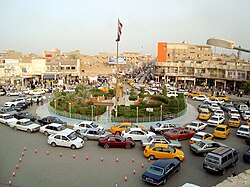Nasiriyah
|
Nasiriyah Arabic: الناصرية An Nāṣirīyah |
|
|---|---|

Nasiriyah town centre
|
|
| Coordinates: 31°03′N 46°16′E / 31.050°N 46.267°E | |
| Country |
|
| Governorate | Dhi Qar |
| District | Nasiriyah |
| Established | 1872 |
| Population (2012 (Estimate)) | |
| • Total | 860,200 |
Nasiriyah (Arabic: الناصرية; BGN: An Nāşirīyah; also spelled Nassiriya or Nasiriya) is a city in Iraq. It is situated along the banks of the Euphrates River, about 225 miles (370 km) southeast of Baghdad, near the ruins of the ancient city of Ur. It is the capital of the Dhi Qar Governorate. Its population 2003 was about 560,000, making it the fourth largest city in Iraq. It had a religiously diverse population of Muslims, Mandaeans and Jews in the early 20th century, but today its inhabitants are predominantly Shia Muslims.
Nasiriyah was founded by the Muntafiq tribe in the late 19th century during the Ottoman era. It has since become a major hub for transportation. Nasiriyah is the center of a date-growing area. The city's cottage industries include boat-building, carpentry and silver working. The city museum has a large collection of Sumerian, Assyrian, Babylonian, and Abbasid artifacts. The ruins of the ancient cities of Ur and Larsa are located nearby.
Nasiriyah features a desert climate (BWh in the Köppen climate classification).
Nasiriyah was founded in 1872 by Nasir al-Saadun Pasha, the sheikh ("chief") of the Muntafiq tribal confederation, after whom the city was named. During that same year, it became the administrative center of the Muntafiq sanjak ("district"). Nasir Pasha was the head of the Sunni Muslim al-Saadun clan, which was the ruling family of the Muntafiq whose tribesmen were mostly Shia Muslims. At the time of Nasiriyah's founding, Muntafiq power in the Basra Vilayet (southern Iraq) had increasingly given way to Ottoman centralization. However, Nasir Pasha was appointed by the Ottomans as the head of the vilayet (province) and registered large tracts of land around Nasiriyah into his name. His son, Saadun Pasha, became the mutassarif (tax collector) of Nasiriyah, and by 1908, he virtually governed southern Iraq on their behalf, having curried their favor by strongly supporting the 1908 Young Turk Revolution.
...
Wikipedia

